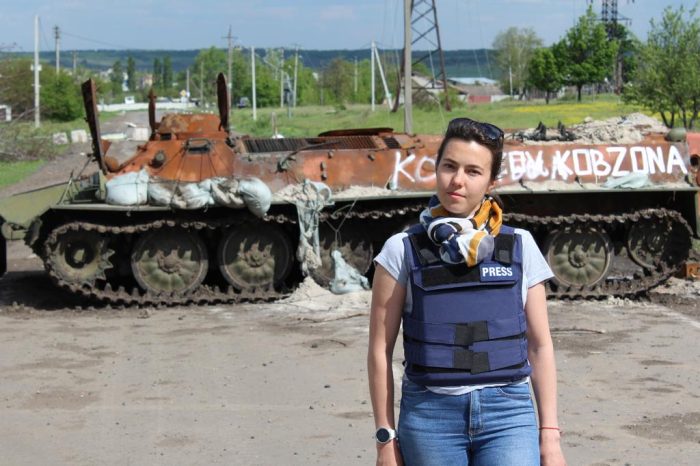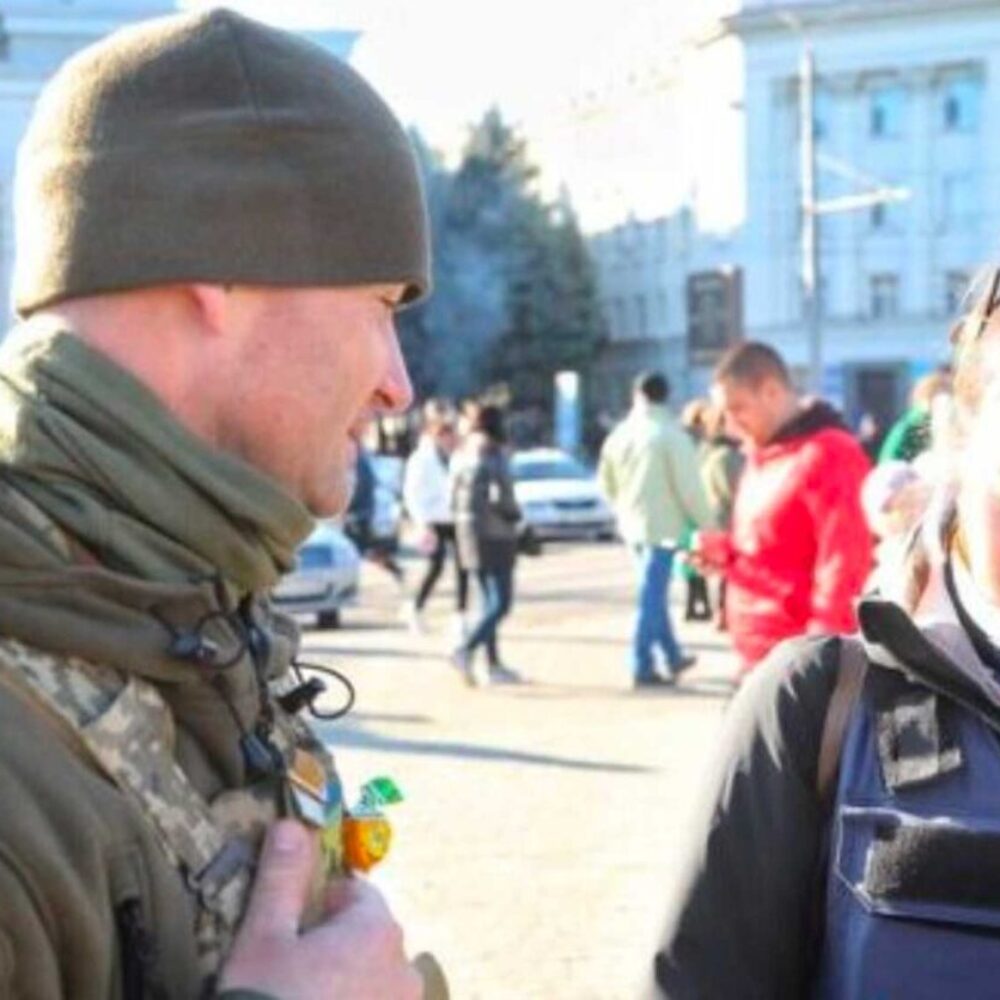THIS INVESTIGATION IS PART OF THE JUSTICE FOR JOURNALISTS FOUNDATION INVESTIGATIVE GRANT PROGRAMME AND WAS INITIALLY PUBLISHED BY AOAV).
In an interview with AOAV’s Executive Director Iain Overton, journalist Anna Vlasenko reflects on her experiences reporting on the war in Ukraine, the impact it has had on her personally, and the importance of amplifying the truth through her work.
Iain Overton: How long have you been working as a journalist, producer, and fixer?
Anna Vlasenko: I started working as a fixer in 2014. Around April 2014, I began my work in Donetsk and Lugansk, primarily with French media. Later that year, towards the end of 2014, I transitioned to working with a humanitarian organisation as a project manager.
Iain Overton: Who did you work for?
Anna Vlasenko: I worked for GIZ, a German organisation.
Iain Overton: And what were your responsibilities with them?
Anna Vlasenko: I managed projects for internally displaced people, particularly focusing on psychological support. We provided assistance to rehabilitation centres and implemented projects that involved training staff on dealing with psychological trauma. The goal was to teach local specialists how to effectively support and assist traumatised individuals in various settings such as hospitals, schools, employment centres, and rehabilitation centres.
Iain Overton: So, before that, what were you doing?
Anna Vlasenko: Before that, I worked as a project manager for a company. Additionally, I started freelance writing for key media outlets.
Iain Overton: What kind of topics did you freelance write about?
Anna Vlasenko: Mostly lifestyle-related articles and interviews. The articles focused more on lifestyle and similar subjects. My main education was in programme management at the National Academy of Public Administration. Journalism was my secondary education
Iain Overton: If the invasion in 2014 and 2022 hadn’t occurred, do you think you would still be working in a combination of administration roles and freelancing?
Anna Vlasenko: Yes, throughout my life, I’ve always had a combination of project management and journalism roles. Before the full-scale invasion, I worked as a media literacy project manager. I was interested in combating propaganda and influencing public opinion through media and social media channels. It was an issue I wanted to address.
Iain Overton: Have you been displaced as a reporter?
Anna Vlasenko: No, I moved away from Kharkiv two years before the full-scale invasion.
Iain Overton: Since the invasion, who have you worked for?
Anna Vlasenko: Last year, I worked as the main producer for Global News Canada. I also worked as a journalist on their web page for them.
Iain Overton: What kind of stories did you cover with them?
Anna Vlasenko: I covered a wide range of stories, including investigations, human interest pieces, and stories from liberated villages in the Kharkiv and Kherson regions. We covered various topics, from individual stories to larger investigations, such as the case of an 11-year-old girl who was killed, where we delved into finding out who was responsible.

Iain Overton: Have you personally witnessed any violence or dangerous situations while working as a reporter? Have you been close to bombings or shootings?
Anna Vlasenko: Fortunately, I haven’t been in very close proximity to violence. There was an incident where an explosion occurred approximately 50-100 meters away from us during a reporting assignment. We could hear the blast due to the shorter distance, but it was still a harrowing experience.
Iain Overton: In your work, have you mainly collaborated with the same reporters, or have you worked with different people?
Anna Vlasenko: Last year, I collaborated with six reporters, but they were on rotation. I primarily worked with two reporters—one for TV and one for online writing. The teams would switch and rotate frequently.
Iain Overton: It must be interesting to work with different reporters and build relationships quickly. How do you navigate such situations where you might be going into dangerous areas with unfamiliar people?
Anna Vlasenko: Firstly, I’m very passionate about my work, and it’s not just about money for me. It’s about my country and the importance of showcasing the truth. I trust my intuition and rely on the team I’m working with. If there’s no trust and comfort within the team, it becomes challenging to produce good material. We support and take care of each other, creating a sense of family. It’s essential to have a good working dynamic and produce quality work rather than focusing solely on personal recognition.
Iain Overton: Can you recall a situation where you disagreed with a certain approach or felt that it was too dangerous?
Anna Vlasenko: For instance, during a visit to a security-sensitive area, it wasn’t just my decision but a collective one made by the team. We had to assess the risks and determine whether it was appropriate to proceed. Safety always takes priority over the importance of a story. In one particular case, we initially decided to leave a location due to the danger but returned the following day because the story was important. However, we always prioritise our safety over the story itself.
Iain Overton: Do you feel any tension between being a critical journalist and a patriotic Ukrainian, especially in situations where bad news about Ukraine might be reported?
Anna Vlasenko: Personally, since I primarily work with foreign media, my perspective is slightly different. I aim to present an accurate picture of events rather than promoting a specific agenda. If I were to write for Ukrainian media, the approach might differ. Ultimately, I want to show the truth without bias or personal motives. My loyalty lies with my country, but I strive to maintain a professional and objective approach in my work.
Iain Overton: Have you faced any backlash from Ukrainian authorities or individuals regarding your reporting for foreign media outlets?
Anna Vlasenko: There have been instances where some accreditation requests were denied – though not people working with me – indicating a possible dissatisfaction with the material or its coverage. However, I cannot speak for the government’s monitoring of all foreign reporting. It’s a complex landscape with information wars and various perspectives. But personally, I focus on presenting the truth to the best of my abilities.
Iain Overton: With the rise of disinformation and manipulated news, do you think foreign journalists coming to Ukraine are well-informed about the reality of the situation?
Anna Vlasenko: It depends on the journalist’s personal approach, curiosity, and level of involvement. Some journalists choose to stay on the surface and report from a distance, while others dig deeper and engage with various sources to understand the situation fully. Their involvement and the questions they ask will determine the depth of their reporting.
Iain Overton: Have you observed any instances where journalists have shown a lack of compassion or surprised you with their behaviour?
Anna Vlasenko: Personally, I haven’t encountered such instances. There is generally a sense of support and understanding among journalists. However, I can’t speak for every journalist’s behaviour as experiences may vary.
Iain Overton: Given the unique nature of this war compared to others, do you think journalists who have previously reported on wars such as Iraq and Afghanistan have a different perception of the situation in Ukraine?
Anna Vlasenko: It’s difficult for me to compare, as I haven’t worked in Syria, Iraq, or Afghanistan. However, I have heard from colleagues who have worked in those regions that the conditions and dangers can be quite intense. Each war has its own unique challenges and dynamics. For example, during the attack on the restaurant in Kramatorsk, which involved journalists, it was a random and unfortunate event. It’s important to consider the context and the specific circumstances when assessing the nature of conflicts and the risks journalists face.
Iain Overton: In terms of the most recent conflict, do you think it has changed you? How has the war impacted you personally?
Anna Vlasenko: Personally, the war has changed me. I have become more focused on becoming the person I want to be. It has made me realise the importance of taking responsibility for my own life and the lives of my loved ones. There is always uncertainty about whether I will see my grandmother or father alive, as they live in the occupied territories. The war has made me a more open person, and I am more focused on doing what I believe is true for myself and for my country. I try to do as much as possible in my job to help show what is happening inside our country. In a way, journalists have become soldiers on the battlefield, making the invisible visible.
Iain Overton: As a journalist, have you faced challenges in terms of relationships and starting a family due to the nature of your work and the constant travel?
Anna Vlasenko: Yes, of course, I want to have a family, children, and a home. But currently, it feels like this role is not possible. The situation is uncertain, and it feels like gambling. Life has its own filters and plans.
Iain Overton: Have you observed a trend among the journalists you’ve worked with regarding how rigorous they are in verifying facts? Do you think some journalists believe things too easily without thorough investigation?
Anna Vlasenko: Most journalists try to monitor different sources, including telegram channels, various media outlets, both Ukrainian and foreign, to get a comprehensive view of the situation. We try to verify information from different angles and talk to as many people as possible. It’s important to get multiple perspectives and not rely on a single source.
Iain Overton: Have you been impressed by the multi-source approach taken by journalists? Or have you observed instances where journalists have run with things without proper scrutiny?
Anna Vlasenko: Since 2014, the journalists I have worked with have shown a commitment to integrity and rigorous reporting. I have had good teachers who have emphasised the importance of thorough research and verification. For me, this multi-source approach is natural and how it should be.
Iain Overton: Looking into the future, what do you think will happen in the war? And what do you see for yourself personally?
Anna Vlasenko: The future of the war is uncertain, and I believe all of us want victory and peace as soon as possible. As for myself, I will continue reporting and doing what I can to support my country. Taking breaks is important for self-care, but my role here is my choice, and I find value in what I do.
Iain Overton: Despite the risks and challenges you face as a journalist, do you find comfort in knowing that you are doing something valuable by amplifying the voices of Ukraine and revealing the truth of the war to the world?
Anna Vlasenko: Absolutely. I believe that by doing my job and presenting the truth, I can influence the decisions of politicians and the support our country receives from foreign nations. It’s about making an impact beyond just reaching a local audience in Ukraine. We are amplifying the voices of a nation and creating awareness internationally. That brings me a sense of comfort and purpose.

